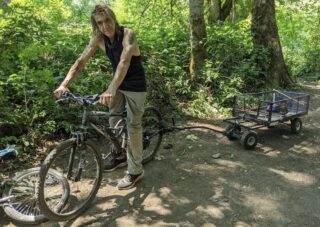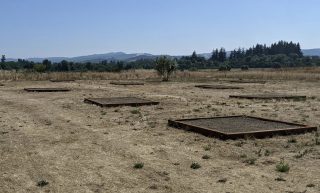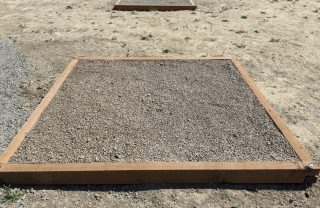(Note: This is part two of Shannon’s story. We posted part one on Monday.)

(Photographed with permission by Shannon Johnson)
This post began with my scouting of a new park for our family to visit on our bikes. It resulted in me coming face-to-face with homelessness in Hillsboro. Which is a unique reason why I think biking is so valuable: it increases our intimacy with our own neighborhood and local community. Biking opens our eyes to what is right around us, but that we might otherwise (in a car) never see.
My original intention was to check out the bike route and amenities at Dairy Creek Park. But after reading reviews that warned about various encampment-related ills (such as trash, feces, and unwelcoming encounters with campers) I was encouraged to also scout out park cleanliness and safety. But even more importantly, I was prompted to take an active interest in the needs of the houseless community near me — because this can’t just be about me. Yes, I want a clean and safe park for my children to play in, but I also — far more importantly — want my fellow neighbors to have a clean and safe place to live.
So I did some research.
According to the January 2021 Point-in-Time Count, there were 716 people in Washington County reported to be experiencing houselessness (including those in shelters and transitional housing). Of those, 357 people were unsheltered. The largest portion of unsheltered people in Washington County, 213, were counted in Hillsboro.

I guessed that the City was hoping to move many of the current Dairy Creek Park campers to a new managed campsite nearby, but I wondered what the folks currently living at the park thought about it. In the many articles and press releases I read about these projects, I saw almost no representation of the voices of the most important people to be considered: the houseless themselves. What do they think of these projects? And will they move to the managed camp or hotel-turned-shelter?
Lastly, to a much lesser degree of importance, what could I learn that might assuage my “mom fears” about bringing my kids to a park space noticeably shared by homeless campers? (Or would I be convinced to stay away?) So I decided to head over and check things out.
Advertisement
He explained that if his bike comes up missing, he just goes around and talks to the neighbors until he finds it and gets it back.
I spent a few hours wandering around the park, and particularly enjoyed talking at length to two of the unhoused folks, Denise and Martin. (Martin is a fellow cyclist. It made me ponder what people mean when they say “the bike community.” In many respects, there is a large divide between my life and Martin’s, but I really like thinking of us as being a part of the same community. Maybe next time, we can get a family photo, all of us together…the biking community!)
The conversations were meandering, but loosely focused on this question: Would you move to the new hotel-shelter downtown, or the managed campsite near the park? What message do you want others to hear about you?
[RELATED: What five people say about living outside along the Springwater path]
In response to moving, Denise said, “I would and I wouldn’t.” She didn’t mind camping out, but she was tired of being herded one direction, told to come here, then go over there. She suspected that most of the people currently living in/around the park would move to the managed camp. “None of us want to wake up every day and wonder if we’re going to have to move.” She looked forward to the stability of a sanctioned campsite and not having to worry if all of her stuff would be “cleaned up” and thrown away while she was absent. “I think the camp will allow me to start living my life.”
However, as Denise has been houseless for many years, she was well aware of the possible drawbacks of shelter efforts, drawbacks that often make shelter scenarios unrealistic, or too onerous, for the people that need them to be able, or willing, to use them. She didn’t mind rules such as being clean and sober, but she resented being policed, or treated like a child or second-class citizen. “I want to be a normal adult — who doesn’t?….There’s no reason we shouldn’t be treated like an adult in an apartment.”
Martin said that “If the rest of them [the community of park campers] go [to the managed campsite], I would go… There are some that don’t want the help. [But] Most of us want the help. I want to make sure the right people will get the help before me.”
Martin admitted that he liked living in the woods. “I’m a starving artist all the way,” he said with a smile. But he acknowledged some of the difficulties, “Laundry’s pretty tough.” I glanced at the creek behind us, the most obvious laundering option in the woods, and that made me wonder: the managed campsite didn’t advertise any laundry services, or showers (which seemed a more glaring drawback, as I considered the realities of long-term camping). “Anything’s better than nothing,” Martin answered. “All of us feel we’ve been left behind.”
Denise said, “I want people to not judge a book by its cover.” She wanted people to get to know each [houseless] person and situation. “There’s a lot of people out here, if their stories were told…different agencies would be willing to help. A lot of people in this community are here for mental health reasons or health reasons. There’s other people down here could use…the help.”
Both Denise and Martin made it obvious that the unhoused community in the area was a really close-knit community. I marveled aloud that Martin’s cargo bike (with his home-made e-assist, which I admittedly coveted), was left unlocked and unattended. “How is that possible?” I asked. He smiled, “we don’t lock our doors in the neighborhood.” He explained that if his bike comes up missing, he just goes around and talks to the neighbors until he finds it and gets it back.
At the time I met him, Martin had gathered up the multiple Winco Shopping Carts, which he was planning to return to the parking lot where they belong. (Winco is basically across the street, but it’s still a good walk over there, especially if one is pushing multiple carts). Denise mentioned doing this too, gathering carts, or collecting trash bags, then asking one of the younger/stronger men in the community to go take them where they should go. She cleans up regularly and even sweeps her campsite, with the hope that doing so will allow her to remain in the park, unmolested by clean-sweeps of campsites. Martin clearly did the same. But they both expressed that there is a group of campers (mostly the younger folks), that didn’t have the same regard. They left trash and didn’t seem to care. “But we’re teaching them,” Martin said, “We’re gonna keep this area clean.” Then curiously added, “They gotta realize this is a family place — it’s not Portland.”
These conversations gave me a lot to think about, as I pedaled over to the managed campsite on SW Wood Street. It was a peaceful looking spot, nestled against Jackson Bottom Wetlands in a largely industrial area, seemingly out on its own. Though the camp hadn’t opened at the time, porta-potties and handwash stations were set up. But again, I rued the lack of showers and laundry facilities (maybe they’ll add these?) Also, after visiting Dairy Creek on a hot day, I noticed the obvious: all of the members of the houseless community that I observed were taking shelter from the heat, in the woods, near the creek, or under the picnic shelters. It was way too hot to be sitting out in the sun. There is no shade in this managed campsite. How would folks deal with the heat? Furthermore, it is a much longer walk to get to any sort of food options. And I didn’t know any of the rules: Curfew? Pets? Allowed/prohibited personal belongings? Would people be allowed fires to cook? Camp stoves? I thought of Martin. What about bike parking? So many details, and any one of them could be the barrier, or the benefit, that would determine if an unhoused person will seek shelter there. Time will tell.
There are a few houses near the managed campsite, and most of the neighboring (housed) residents seem unwelcoming of the camp moving into their immediate neighborhood. I was able to speak to Damian, a nearby homeowner, who provided a unique perspective, in that he used to be a houseless veteran himself. He is frustrated that, in his opinion, the City is merely working to improve its image, rather than provide actual housing for people. “Out of sight, out of mind,” he fumed. He would much prefer to see efforts to “bring [unhoused folks] back into society, rather than shoving them out of sight, where no one can see them.” He spoke about the need for more ways to help people to receive housing. “You can’t get a rental contract if you live in a tent, or have a felony.” There are many barriers, and not many options. I asked him how he would feel if the city were building a low-income (or free!) apartment complex to house the currently houseless, on the same site. “That would be smart,” he replied. He would welcome it, if it was real housing, with showers, services. And I admit, I was beginning to share that sentiment. I know, temporary and immediate options can be, “better than nothing” (in Martin’s words), but with the lack of showers, shade, laundry; it felt like it was something, yes, but not nearly enough.
As for my perceptions about trash and safety, and taking my kids to Dairy Creek Park? I’m still turning that over in my head and heart. That will be a future post, and hopefully I’ll have the kiddos in tow. Because this is just the beginning of the conversation. And it’s a conversation I also want my children to be a part of. We all share this space, and we need to figure out how to do so, better, together.
And I know, I’m just on my bike in this little corner of Hillsboro.
What is happening in your corner of town? How do people living outside affect you and your use of parks and public spaces? What solutions do you see working (or failing)? And if you are houseless or formerly houseless, please let us know what has helped or hindered you.
— Shannon Johnson, shannon.marie.johnson915@gmail.com
— Get our headlines delivered to your inbox.
— Support this independent community media outlet with a one-time contribution or monthly subscription.


